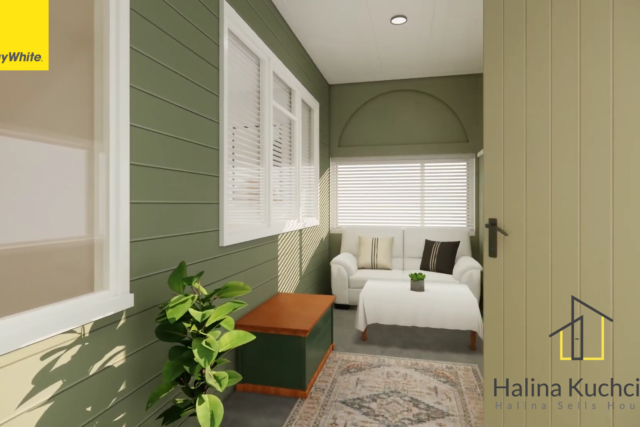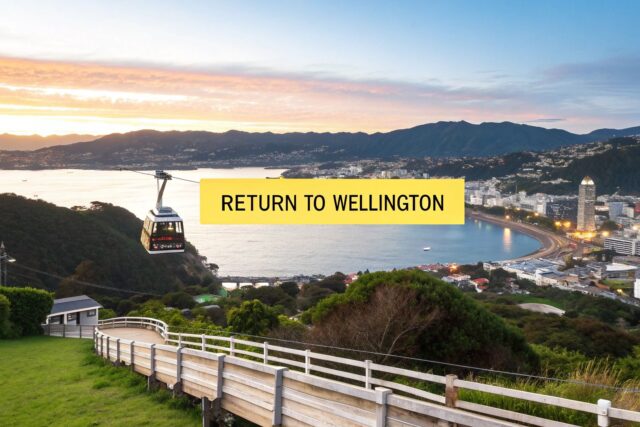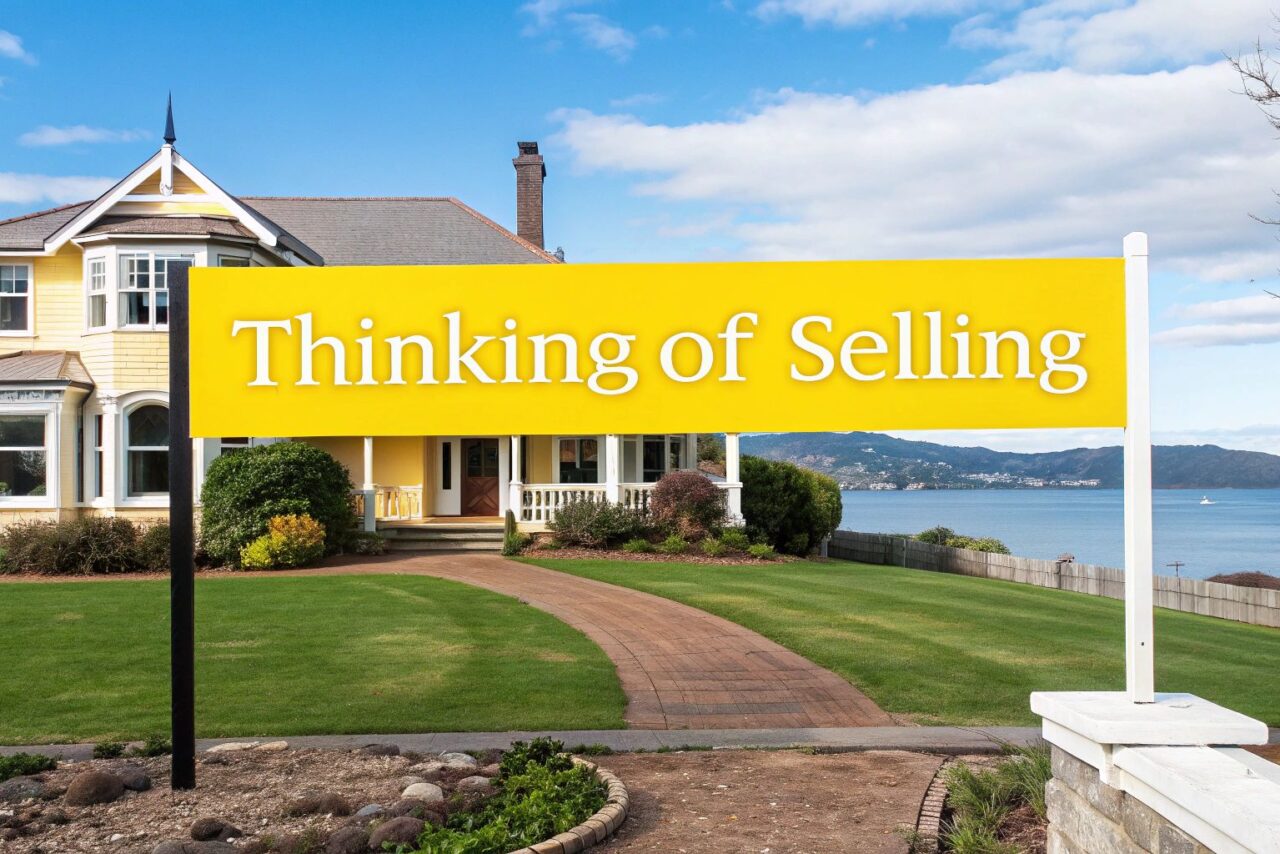
Thinking about selling your Wellington property? It’s a big question, and the answer isn’t a simple yes or no. The right time depends far more on your specific suburb and personal situation than any national headline. While some areas are seeing buyers act with a bit more caution, other pockets of Wellington, from the family-friendly streets of Karori to the vibrant apartment hubs of Te Aro, still have strong demand. This is why a localised strategy is absolutely essential to get the best result.
Is Now a Good Time for Selling in Wellington?
The decision to sell your home is a huge one, and the question “is now a good time?” is always front and centre. It’s easy to get caught up in broad national trends, but the truth is, real estate is hyper-local. What’s happening in Auckland often has little to do with the unique pulse of Wellington’s property market. To get a real feel for the current climate, you need to look at our own neighbourhoods. Wellington’s market is a tapestry of distinct suburbs, each with its own rhythm, buyer demographic, and unique appeal.
Understanding Local Suburb Dynamics
Not all Wellington suburbs are moving at the same speed. We’re seeing different levels of buyer activity and price sensitivity from one spot to the next.
- Family-Focused Suburbs: Places like Karori, Khandallah, Ngaio, and Wilton are magnets for families looking for good schools, a community vibe, and a bit more space. Well-presented family homes in these areas often attract consistent interest.
- Inner-City Living: In contrast, suburbs like Te Aro, Mt Cook and Mount Victoria, dominated by apartments and townhouses, cater to a completely different crowd. Their market can be swayed by things like the housing preferences of young professionals and proximity to the CBD.
- Character and Coastal Appeal: Suburbs such as Aro Valley, Berhampore, Island Bay, and Lyall Bay have that unique lifestyle draw. Buyer demand here can be fierce, especially for properties that really capture the essence of character living or a life by the sea.
Understanding these micro-markets is key. A three-bedroom home in Crofton Downs will have a completely different buyer journey than a two-bedroom apartment in Thorndon. To get a clearer picture, it’s worth exploring our detailed guide on Wellington house prices to see how your suburb is performing.
The Impact of Wellington’s Seasons
Our city’s distinct seasons play a surprisingly big part in the selling process. A smart seller knows how to use this to their advantage.
Summer often brings out more buyers. The longer daylight hours make it easier for people to pop in for viewings after work. Gardens in suburbs like Wilton and Wadestown are in full bloom, which adds massive street appeal.
On the flip side, a cosy, warm, and dry home can be incredibly appealing during a blustery Wellington winter. It really stands out, especially when there’s typically less stock on the market. Smart presentation can highlight your home’s warmth and comfort, attracting serious buyers looking to escape the southerly. Timing it right can make a huge difference to buyer turnout and the final offers you receive.
National Trends and Local Realities
It’s always wise to keep an eye on the bigger picture. Recent data shows a complex national market. A June 2025 QV House Price Index report noted a slight quarterly dip in average national home values, reflecting a cautious buyer sentiment amid economic uncertainty.
But that doesn’t tell the whole story. Some regions actually saw growth, while major centres like Wellington experienced some price softness. This just reinforces the fact that while national data provides context, it’s local expertise that gets a great result.
The key takeaway is this: A successful sale in Wellington isn’t about timing the market perfectly—it’s about understanding the current market and creating a strategy that puts your property in the strongest possible position.
Ultimately, the best time to sell is when it lines up with your own personal and financial goals. To help you weigh up the market, have a read of Why Now Is A Great Time To Sell Your House. The most crucial first step is to get an accurate, up-to-date appraisal of your property’s value in today’s environment.
Preparing Your Property to Impress Buyers
When you’re thinking of selling, your property gets just one chance to make a fantastic first impression. In a competitive market like Wellington, presentation isn’t just a nice-to-have; it’s a non-negotiable part of getting the best possible price. It’s all about creating a space where buyers can instantly see themselves living, whether they’re walking through a character villa in Wadestown or a modern apartment in Te Aro. This means going beyond a quick tidy-up to strategically showcase your home’s best features. Taking care of the small details now stops them from becoming big distractions for buyers later on.
The image below shows just how critical professional presentation is to securing the right price.
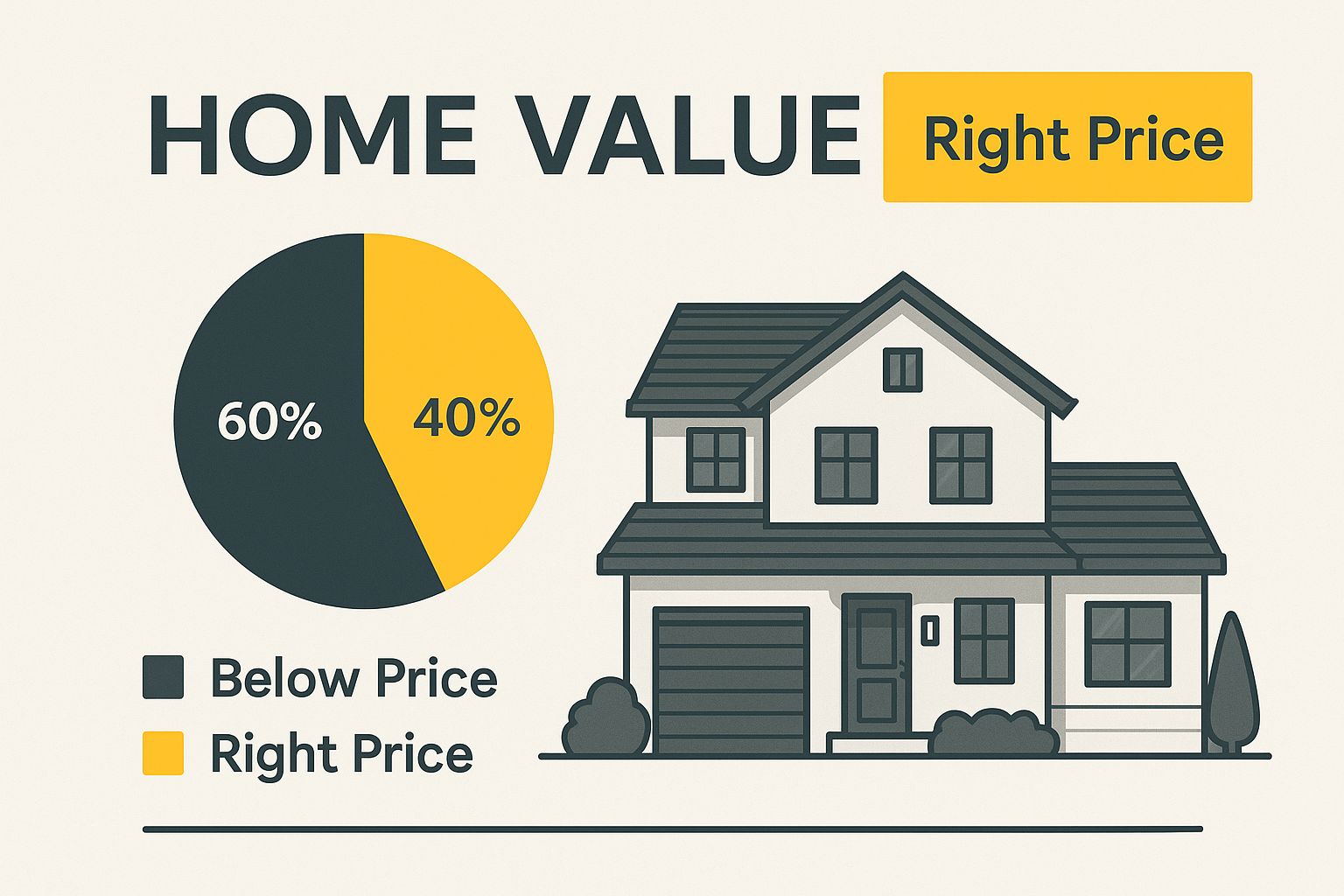
As you can see, a beautifully presented home, paired with a smart pricing strategy, is the foundation for attracting serious, quality buyers.
Prioritise Essential Repairs
Deferred maintenance can be a huge red flag for buyers, making them wonder what else might be wrong with the house. Before your first open home, walk through your property with a critical eye and make a list of everything that needs fixing. Little jobs can make a world of difference. A dripping tap, a door that sticks, or a cracked windowpane might seem minor to you, but they can plant seeds of doubt in a buyer’s mind. Fixing these things shows you’ve taken pride in your home and builds their confidence. Here in Wellington, you also have to think about our unique weather. Make sure your exterior is ready for anything: check for loose roof tiles, clear out your gutters, and ensure all windows are properly sealed to handle the next southerly gale.
Declutter and Depersonalise
Next up is creating a sense of space and possibility. You want buyers to see the house and its potential, not your personal life story.
- Remove Personal Items: It’s time to pack away family photos, your kids’ artwork, and any personal collections. This helps buyers mentally ‘move in’ and picture their own lives in the space.
- Clear the Decks: Kitchen benchtops, bathroom vanities, and desks should be as clear as you can get them. This instantly makes the home feel cleaner, more organised, and more spacious.
- Show Off Your Storage: Overstuffed cupboards can give the impression that the home is short on storage. It might be worth hiring a small, temporary storage unit for non-essential items. This makes your built-in storage look generous and appealing.
A decluttered home feels larger, brighter, and way more inviting. It lets buyers focus on the property’s best features—like the beautiful timber floors in a Newtown villa or that stunning harbour view from a Roseneath apartment—instead of being distracted by your stuff.
The Power of Home Staging
Professional home staging is the art of preparing a property for sale, and honestly, it’s one of the most powerful marketing tools out there. It can completely transform a space, highlight its strengths, and create a genuine emotional connection with buyers. We’ve seen firsthand how staging can dramatically change a sale. I remember a vacant property in Brooklyn that sat on the market for weeks with hardly any interest. After we had it professionally staged, it received multiple offers within a fortnight. The furniture gave each room a clear purpose and showed buyers exactly how to use the layout. And staging isn’t just for empty houses. Even if you’re still living there, a stager can work wonders by rearranging your furniture, bringing in a few key pieces, and adding neutral decor to broaden its appeal. This is especially effective for maximising light in south-facing Karori homes during the winter months. For a deeper dive into getting your home ready, check out our article on the 3 things you need to know before selling your house.
Pre-Sale Preparation Checklist: High ROI vs. Low ROI
Not all pre-sale jobs are created equal. Some give you a fantastic return on investment, while others are more of a money pit. Based on what we see working in the Wellington market, here’s a breakdown to help you focus your time and budget where it counts.
| Task | Potential ROI | Typical Cost (NZD) | Wellington-Specific Tip |
|---|---|---|---|
| Kitchen Refresh | High | $2,000 – $7,000 | Buyers love modern kitchens. Even painting cabinets, updating handles, and a new splashback can add serious value without a full reno. |
| Interior Painting | High | $3,000 – $8,000 | A fresh coat of neutral paint (think warm whites or light greys) makes spaces feel bright, clean, and new. It’s one of the best returns. |
| Professional Staging | High | $2,500 – $5,000+ | Staging helps buyers connect emotionally and visualise the lifestyle. It often leads to faster sales and higher offers. |
| Garden Tidy-Up | High | $500 – $2,000 | First impressions count! Tidy lawns, weeded gardens, and some fresh bark make a huge difference, especially for city-fringe homes. |
| Full Bathroom Reno | Medium-Low | $15,000 – $30,000+ | A full renovation is costly and you may not recoup the full amount. A simple refresh (new vanity, taps, paint) is often smarter. |
| New Carpet | Medium-Low | $4,000 – $10,000+ | Only replace if it’s very worn or dated. A professional deep clean can often work wonders for a fraction of the price. |
| Major Landscaping | Low | $10,000+ | Extensive landscaping projects rarely pay for themselves at sale time. Focus on neatness and presentation over a complete redesign. |
Ultimately, the key is to make smart, targeted improvements that appeal to the widest range of buyers without overcapitalising. Finally, a deep clean is an absolute must. To make sure your property is sparkling and ready for a smooth handover, this comprehensive guide to end of lease cleaning has some fantastic tips that are perfect for any pre-sale prep. When you’re ready to chat about a specific plan for your home, I’m here to give you expert advice on what else is involved in preparing your property for a successful sale.
Getting Your Legal Ducks in a Row
Selling your home is about more than just a great presentation; it’s a major legal transaction that you need to get right. Understanding your obligations from the get-go is absolutely crucial for a smooth, stress-free sale that protects everyone involved. This is where engaging a conveyancing lawyer early is non-negotiable.
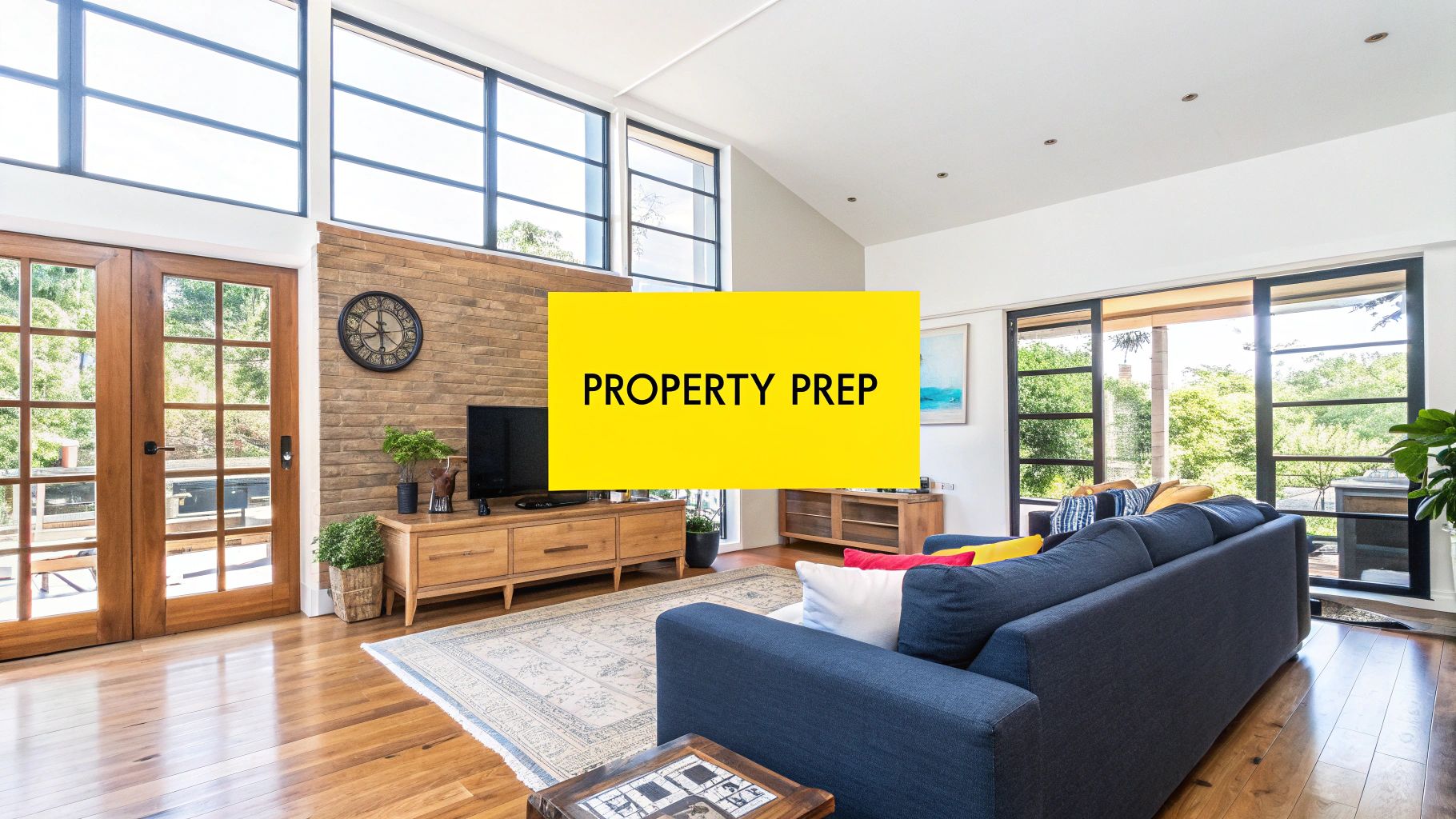
The whole process, from drafting that initial sale agreement right through to handing over the keys, is managed by a legal professional called a conveyancer. Their job is to make sure every legal box is ticked, your interests are looked after, and the ownership transfer happens without a hitch. A common mistake I see is people waiting until an offer lands on their table to hire a lawyer. My advice? Get one on board much, much earlier.
The Crucial Role of Your Conveyancing Lawyer
Bringing a conveyancing lawyer or solicitor into the picture early in your “thinking of selling” journey is one of the smartest things you can do. Think of them as your legal guide, responsible for several key stages of the sale.
An experienced lawyer will:
- Prepare the Sale and Purchase Agreement: This is the core legal contract for your sale. Your lawyer makes sure it includes all the necessary clauses to protect you.
- Review the Property Title: Before you even go to market, they’ll check for any issues like easements or covenants that could trip things up later.
- Handle Negotiations: If a buyer’s conditions or building report throws up some legal curveballs, they’ll advise you and manage those negotiations.
- Manage the Settlement Process: On settlement day, your lawyer is the one coordinating with the buyer’s lawyer to transfer funds, pay off your mortgage, and officially change the property title.
Having them involved from the start means you can tackle potential problems proactively, avoiding those stressful and often costly delays down the line.
Wellington-Specific Legal Considerations
Selling in Wellington? It comes with its own set of legal quirks you absolutely need to be aware of. Our city’s unique geography and building history mean sellers have some very specific disclosure duties. For example, looking at the New Zealand housing market in 2025 shows just how much local knowledge matters. The Reserve Bank of New Zealand’s House Price Index pointed to a national residential price dip of 1.82% year-on-year in Q1 2025, but that figure hides some wild regional differences. While Auckland’s median price dropped, the West Coast shot up by a massive 35.5%. It’s a stark reminder that national trends don’t always apply here, making spot-on legal and market advice essential. You can dig into the numbers in the full [New Zealand house price history report](https://www.globalpropertyguide.com/pacific/new- zealand/price-history).
It is absolutely vital that you are upfront and transparent about your property’s history. Failure to disclose known issues can lead to serious legal complications after the sale is complete.
Here are a few key things to chat about with your lawyer:
- Earthquake-Prone Buildings (EPB): If your property has received an EPB notice from the Wellington City Council, especially an apartment or commercial building, this must be disclosed to all potential buyers. Your lawyer will ensure this is correctly handled in the sale agreement.
- Land Insurance (EQC): In our shaky city, buyers will be very keen to see any past EQC claims. Your lawyer can help you gather and present this information clearly and accurately.
- Council Zoning Updates: Zoning changes in suburbs like Johnsonville or Newlands can affect a property’s potential use or development rights. It’s important to check the latest council plans and disclose anything that’s relevant to a buyer.
My role, and that of your lawyer, is to translate all this legal jargon into plain English. By working as a team, we can make sure all your bases are covered, giving you total confidence as you move forward with your sale. When you’re ready to talk next steps, I can help you understand what else is involved and connect you with trusted legal professionals I’ve worked with for years.
Decoding Wellington Buyer Behaviour
To get the best possible price when you sell, you need to step into the shoes of your potential buyer. It’s that simple. Understanding what motivates them, what gets them excited, and what their concerns are is the real secret to a standout marketing campaign and, ultimately, a great result on sale day. The Wellington market is full of nuances. Buyer behaviour can change completely from one suburb to the next, driven by everything from school zones to the local café culture. The landscape has certainly shifted over the past few years. Buyers today are more informed and often a lot more cautious than they used to be. They take their time, do their homework, and want to feel absolutely confident they’re making a sound investment. This might mean properties take a little longer to sell, but it also means that quality, well-presented homes are still getting serious attention.

What Different Buyers Are Looking For
Buyer demand across Wellington isn’t a one-size-fits-all situation. The “ideal” property changes dramatically depending on the neighbourhood, which really just reflects the diverse lifestyles our city offers.
- Family Homes in the Suburbs: In places like Karori, Wilton, and Northland, buyers are typically on the hunt for space, good school zoning, and a real sense of community. They’ll prioritise properties with multiple bedrooms, a garden for the kids, and good indoor-outdoor flow. Off-street parking is often a non-negotiable here.
- Apartments and Townhouses in the City: Head into Te Aro, Mt Cook, or Thorndon, and the buyer profile flips completely. Here, it’s all about lifestyle and convenience. They value being close to work, restaurants, and entertainment. Low-maintenance living is king, and things like a secure car park or a modern, well-run building are major selling points.
- Character and Charm: Suburbs like Aro Valley, Mount Victoria, and Berhampore attract a different kind of buyer—one who is drawn to character villas and bungalows. These purchasers often appreciate unique features and are willing to invest in a home with history, as long as it has been well-maintained.
When we know who your target buyer is from day one, we can tailor the entire marketing strategy—from the photography style to the open home experience—to connect with their specific wants and needs.
Interpreting Open Home Feedback
Open homes are so much more than just a chance for people to wander through your house. They are a goldmine of real-time market feedback. The comments and questions we hear directly from buyers are invaluable for fine-tuning our strategy as we go.
By listening carefully, we can identify:
- Price Perceptions: Are visitors surprised by the price guide, or does it seem to line up with their expectations? If we consistently hear that the price feels too high, that can be an important early warning sign.
- Presentation Issues: Are several people commenting on the small size of the second bedroom or the lack of afternoon sun? This helps us proactively address any objections that keep coming up.
- Standout Features: What are buyers getting most excited about? Knowing what they love helps us make sure we’re highlighting those features even more in our marketing.
By actively listening and adapting, we can pivot our strategy if needed. It’s not about taking every single comment to heart, but about spotting consistent patterns that give us a true reading of how the market is responding to your property.
Aligning with Current Market Realities
Recent market activity gives us the critical context we need. For instance, transaction data for June 2025 showed a 20.3% year-on-year increase in the number of properties sold nationally, which points to a rising level of activity. At the same time, the median number of days to sell also increased slightly to 50 days. This suggests that while more homes are selling, buyers are being more deliberate. This dynamic, where vendors sometimes receive offers below their initial expectations, reinforces just how important realistic pricing is from the outset to attract the right kind of interest. For a more detailed look at these trends, you can explore the full REINZ June 2025 property market update.
This is where a skilled agent adds immense value. We combine this broad market data with on-the-ground insights from your specific suburb to set a price that is both ambitious and achievable. Understanding current offer levels and negotiation trends in areas from Kingston to Khandallah ensures we position your property to maximise its final sale price.
Choosing the Right Agent for Your Sale
When you’re thinking of selling your Wellington home, the single most important decision you’ll make is picking the right real estate agent. This isn’t just about putting a sign up. It’s about choosing a trusted advisor who will expertly guide you from day one, right through to settlement day. Think of your agent as your strategist, your negotiator, and your market expert, all rolled into one. They offer much more than a price estimate; they provide a full property appraisal backed by hyper-local data from suburbs just like yours, whether it’s Thorndon, Oriental Bay, or Ngaio. This appraisal is the foundation for a winning marketing campaign designed to get the highest number of qualified buyers through your door.
The Value of Local Expertise
Here in Wellington, local expertise is absolutely non-negotiable. An agent who genuinely gets the subtle differences between Wadestown and Wilton, or Kelburn and Karori, brings a massive advantage to the table. They know what buyers in each little pocket are looking for, what recent sales have actually achieved, and how to position your home to stand out from the rest.
This deep local knowledge is critical when it’s time to decide on the best way to sell your property.
- Tender: This method is often a great choice for unique or high-value homes, especially in places like Roseneath or Oriental Bay. It creates a competitive buzz without putting a price tag on it publicly.
- Auction: In a market with strong buyer demand, an auction can create a fantastic result. It builds urgency and transparency, often pushing the price up.
- Fixed Price (By Negotiation): This is a straightforward approach that many buyers appreciate for its clarity. It can be really effective for properties in areas like Johnsonville or Newlands, where buyers might be working to a specific budget.
An experienced local agent will look at your specific property and the current market conditions to recommend the strategy that gives you the best shot at a premium price.
Questions to Ask a Potential Agent
Interviewing agents is a step you can’t skip. You need to feel confident in their skills and comfortable with how they communicate. Don’t be shy about asking direct questions to get a feel for their approach.
Here are a few essentials to get you started:
- How will you determine the market value of my home? You’re looking for an answer that involves a detailed Comparative Market Analysis (CMA), not just a quick guess from an online tool. They should be talking about specific, recent sales right in your neighbourhood.
- What is your specific marketing plan for my property? A great agent will lay out a clear, multi-channel strategy. This should cover everything from professional photography and online listings to social media promotion and local advertising.
- How will you manage buyer negotiations? You need an experienced negotiator in your corner, someone who can confidently handle offers and counter-offers to get the best possible terms and price for you.
A dedicated agent like myself focuses on creating a personalised experience. It’s about building a partnership based on trust, transparent communication, and a shared goal of achieving an exceptional outcome for your property.
Red Flags to Watch Out For
Knowing what to look for is important, but knowing what to avoid is just as crucial. A few red flags should make you think twice before signing on. Be wary of any agent who promises an unrealistically high sale price without solid data to back it up. The same goes for anyone who pressures you to sign an agreement on the spot. Another big warning sign is poor communication. Your agent should be proactive, giving you regular updates on buyer feedback and what’s happening in the market. A great partnership is built on clear, consistent dialogue. For more on this, you might find it helpful to read our guide on the top 3 characteristics of a great real estate agent.
Ultimately, your choice of agent will shape your entire selling experience. Take your time, do your homework, and choose a professional who has a proven track record in your area and whose approach lines up with your own goals. The right partnership will not only maximise your sale price but also make the whole journey as smooth as possible.
Common Questions About Selling in Wellington
When you start thinking about selling your home, a million questions can pop into your head. It’s completely normal. To give you some clarity, here are some straightforward answers to the queries we hear most often from Wellington homeowners. We’ll draw on our local market experience to cut through the noise and help you move forward with confidence.
Do I Really Need to Professionally Stage My Home?
This is a classic Wellington seller myth: “Staging is only for million-dollar homes.” The truth is, while it’s not a must for every single property, professional staging often makes a world of difference across all price points. In character-heavy suburbs like Kelburn or Roseneath, it helps buyers form an emotional connection and really see themselves living in the space. Staging is all about highlighting your home’s best assets, making every room feel as spacious as possible, and creating a warm, inviting atmosphere. The usual result? A faster sale and a better price. We can chat about whether it’s the right move for your specific property and budget.
What Is a Realistic Timeframe to Sell in Karori or Khandallah?
The median time to sell in Wellington can change with the market, but it’s always a good idea to plan for a solid 4-6 week marketing campaign. After that, there’s the settlement period, which we’ll negotiate to suit both you and the buyer. Of course, this can vary. A well-presented and smartly priced home in a sought-after area like Ngaio or Khandallah could get snapped up much quicker. In contrast, a unique property in Karori might need a little more time to find its perfect buyer. When we do your property appraisal, we can give you the most up-to-date stats for your neighbourhood.
The key is being prepared. Having all your documents ready, like a LIM and builder’s report, creates a smooth, transparent process that serious buyers really appreciate.
How Do I Determine the Right Asking Price?
Pricing your home correctly is part art, part science—it’s a mix of hard data and real, on-the-ground market knowledge. The first thing we do is a detailed Comparative Market Analysis (CMA), where we look at recent, verified sales of similar homes in your immediate area, whether that’s Wilton, Brooklyn, or Vogeltown. But a CMA is just the starting point. We then factor in current buyer demand, what other properties are on the market, and the feedback we get from open homes. This comprehensive approach means we set a price that attracts serious offers without leaving any money on the table. Online estimates just can’t match this level of local insight.
What Are the Biggest Mistakes Sellers Make?
A few common slip-ups can unfortunately drag down your final sale price. The ones we see most often include:
- Overpricing from the start: This can scare off early buyer interest, which is often when your property gets the most eyeballs on it.
- Skipping necessary repairs: Small, ignored issues can make buyers worry about bigger, more expensive problems hiding out of sight.
- Choosing an agent on commission alone: Going for the cheapest agent instead of the one with the best experience, marketing plan, and negotiation skills often costs you more in the long run.
In Wellington, another classic pitfall is not being fully up to speed on specific legal requirements, like disclosures around earthquake strengthening. By sidestepping these common mistakes, you’re setting yourself up for a much smoother and more profitable sale.
Are you thinking of selling and want clear, honest answers tailored to your home? Halina Kuchciak is here to help you navigate the Wellington market with confidence. Book your free, no-obligation property appraisal today and let’s create a winning strategy together.

.
.
.
.
.
.
Disclaimer: The real estate content shared on this blog is intended for general informational purposes only and industry observations. The content may reflect personal views or reference third-party sources, but it is not a substitute for tailored professional advice. Real estate decisions often involve legal, financial, and regulatory complexities, and readers should seek independent guidance from qualified specialists such as legal advisors, financial consultants, or compliance professionals before acting on any information presented here. No warranty is given as to the accuracy, completeness, or current relevance of the material.



